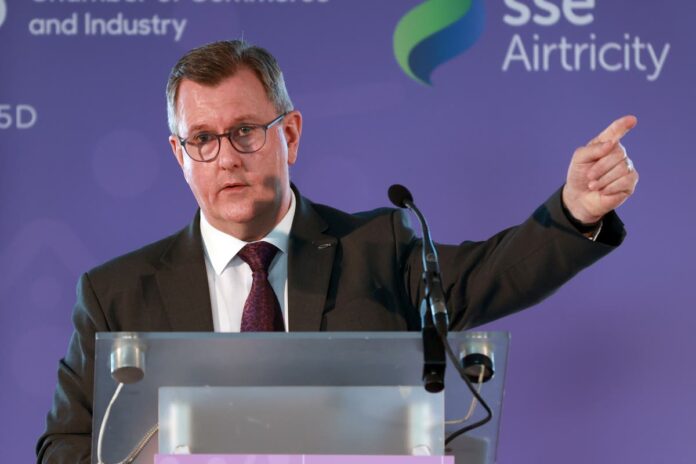A UK Government plan for electronic travel passes for certain travellers crossing the Irish border will not damage the tourism sector in Northern Ireland, the leader of the DUP has said.
Sir Jeffrey Donaldson said the alternative to using the electronic travel authorisation (ETA) scheme for cross-border travel would be applying it to journeys from Northern Ireland into the rest of the UK.
Under new post-Brexit immigration and border control legislation going through Westminster, non-Irish EU citizens living in or visiting the Republic of Ireland would require an ETA to cross the border into Northern Ireland.
Ireland’s Foreign Affairs minister Simon Coveney (left) and Northern Ireland Secretary Brandon Lewis discussed the ETA issue at a meeting in Dublin last week (Brian Lawless/PA)
(PA Wire)
The visa-waiver style scheme, which would be similar to the one used in the US, would not apply to Irish or UK citizens, who are guaranteed free movement around the island under the terms of the long-standing common travel area (CTA) agreement.
The UK Government has insisted the ETA process will be simple and will not involve physical checks on the border.
However, the Irish Government has expressed concern and asked for the island of Ireland to be treated as a special case.
Sir Jeffrey was asked about the electronic authorisation issue on Monday as he fielded questions from business leaders at a pre-Assembly election event in Belfast organised by the Northern Ireland Chamber of Commerce (NI Chamber).
Earlier, the DUP leader had set out his party’s plans to invigorate the Northern Ireland economy, a policy agenda that includes an ambition to make tourism in the region a £2 billon industry.
Sir Jeffrey was asked whether that target would be undermined if tourists visiting the Republic of Ireland were put off travelling north as a result of the new bureaucracy.
Sir Jeffrey Donaldson speaks at 5 Leaders, 5 Days event hosted by the Northern Ireland Chamber (Liam McBurney/PA).
(PA Wire)
The Lagan Valley MP said if ETAs were not required on cross-border travel, then they would be needed for NI to GB travel.
“Let’s be clear on this – the Government will carry out checks on the movement of people within the common travel area and I don’t want that to be at the point of entry between Northern Ireland and Great Britain, because that adds further to our difficulties in terms of our connectivity with the rest of the UK, which is our biggest market,” he said.
“I don’t think this will impact on tourism. I think that if we’re sensible and there’s a sharing of information within the common travel area about the people entering the common travel area we can minimise any friction that may arise from the need to ensure that we understand who’s coming into the CTA.
“We fought hard to ensure that the common travel area was preserved in the Brexit negotiations, that the integrity of the free movement of people within the common travel area was preserved.
“We’ve achieved that, but in order to ensure that we preserve the integrity of the common travel area, then we have to know who’s entering the common travel area, and I think if we can get arrangements with the Irish Government for sharing that information, then I think this can be dealt with sensibly.
“But, frankly, if the choice is between those checks being carried out at Dublin airport, or being carried out at Belfast airport, I know what my choice would be.
“I don’t think it is right that we would have to be subjected to additional checks simply because we want to travel within our own country.”










